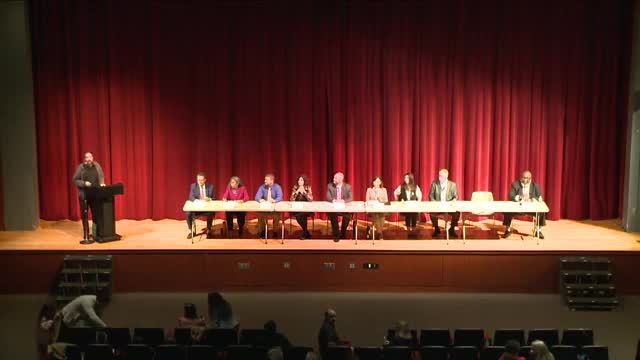Ten candidates at Woburn CPAC forum debate budget, inclusion, diversity and student safety ahead of Nov. 4 election
Get AI-powered insights, summaries, and transcripts
Subscribe
Summary
At a candidate forum hosted by the Woburn CPAC at Woburn Memorial High School, ten people seeking seats on the Woburn School Committee discussed priorities including special-education funding, inclusive classrooms, recruiting diverse staff, school safety and a multiyear capital plan.
At a forum hosted by the Woburn Community Parent Advisory Council (CPAC) at Woburn Memorial High School, ten candidates seeking seats on the Woburn School Committee outlined competing priorities and answered community questions on budgeting for vulnerable students, inclusion and special education, recruiting diverse staff, school safety and a forthcoming school-building plan.
The event, which the CPAC said was intended to surface concerns from families of students with disabilities and other community members, focused repeatedly on how the district will fund and staff special education and other supports for multilingual, immigrant, low-income and unhoused students. Candidate Maria Teresa Nagel, who directs the Office of Immigrant Affairs in Somerville, said the district must align spending with values: “If our values are that we are going to ensure that every child, no matter their background, their learning abilities, they are going to be supported, then that is the way that we need to be investing our funding.”
Why it matters: Voters will decide seats on Nov. 4, and several candidates framed the immediate consequence of the vote around priorities that affect day-to-day services — staffing for individualized education programs, outreach and translation services, and long-term capital needs for school facilities.
Most candidates said they would pursue multiple revenue and efficiency strategies rather than recommend cuts to mandated services. Several cited grants and federal and state funding streams as offsets. Candidate Provencher noted state reimbursements, saying the district receives nearly $5.2 million “which includes a carry over from prior year” under the special-education circuit-breaker program; other candidates referenced Chapter 70 education aid. Multiple speakers urged more aggressive grant-seeking and partnerships to expand available resources.
On the district capital plan, a number of candidates called for clearer communication and community engagement. Candidate Jesse Wetzel, who identified a proposed five-year capital-improvement request for fiscal 2026–2030 at about $25,600,000 with roughly $12,000,000 proposed for the coming year, said the scale of work requires spreading resources to avoid gaps.
Inclusion and special education dominated the forum. Several candidates described the least-restrictive-environment principle and urged more co-taught classrooms and shared services so students can stay in neighborhood schools. Colleen Cormier, a current School Committee member, described existing early childhood inclusion programs in the district (RISE, GAIN, SOAR) and emphasized the need to staff them with legally mandated positions so students and teachers can be supported.
Candidates also addressed communication and trust. James E. Austin, a current School Committee member and chair of the Community Relations Subcommittee, said he has organized student listening sessions and urged the board to “listen first” to families. Multiple candidates said rebuilding trust will be central to navigating redistricting and the building plan; several suggested more frequent, technologically accessible meetings and advisory sessions to broaden participation.
On recruiting and retaining diverse staff, many candidates said the district should expand recruitment channels, attend targeted job fairs and develop succession and onboarding plans. Candidates noted that roughly 40% of the district’s students are nonwhite while the administration is substantially less diverse; one speaker said the administration is “97% white.” Multiple candidates proposed partnerships with university programs, HBCUs and regional superintendent groups to widen the candidate pool and improve retention through mentoring and professional development.
Student safety and school climate were recurring themes. “The most important issue that Woburn Public Schools is facing is safety for our students,” said James E. Austin. Other candidates said restoring pride and trust in the schools — and making buildings and programs inviting so students attend and thrive — were top priorities.
The forum included brief candidate biographies and closing statements; CPAC organizers invited attendees to a free virtual workshop on Oct. 27 in partnership with the Federation for Children with Special Needs and reminded voters the municipal election is Nov. 4.
Notes on the record: candidates repeatedly cited the importance of legally mandated special-education services (Chapter 70 funding and the circuit-breaker reimbursement program), sought more transparent communication around the district’s building plan, and emphasized a mix of grant-seeking, city collaboration and efficiency reviews to sustain programs. No formal votes or committee actions were taken at the forum.
The CPAC moderator framed the event as a structured opportunity for voters to hear how candidates would address school budgets, inclusion and staff diversity; candidates answered five community-sourced questions in one-minute turns and offered longer closing remarks. The forum was broadcast by Woburn Public Media and held at Woburn Memorial High School.
